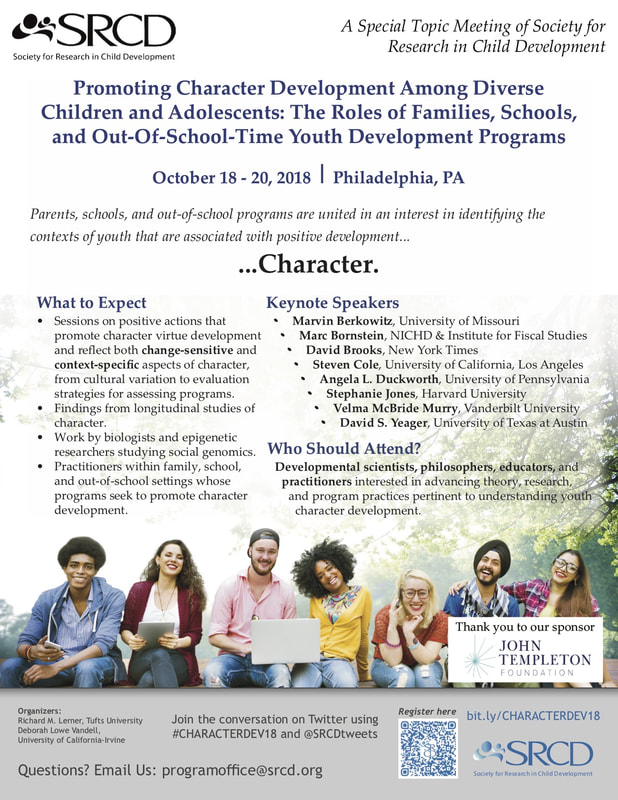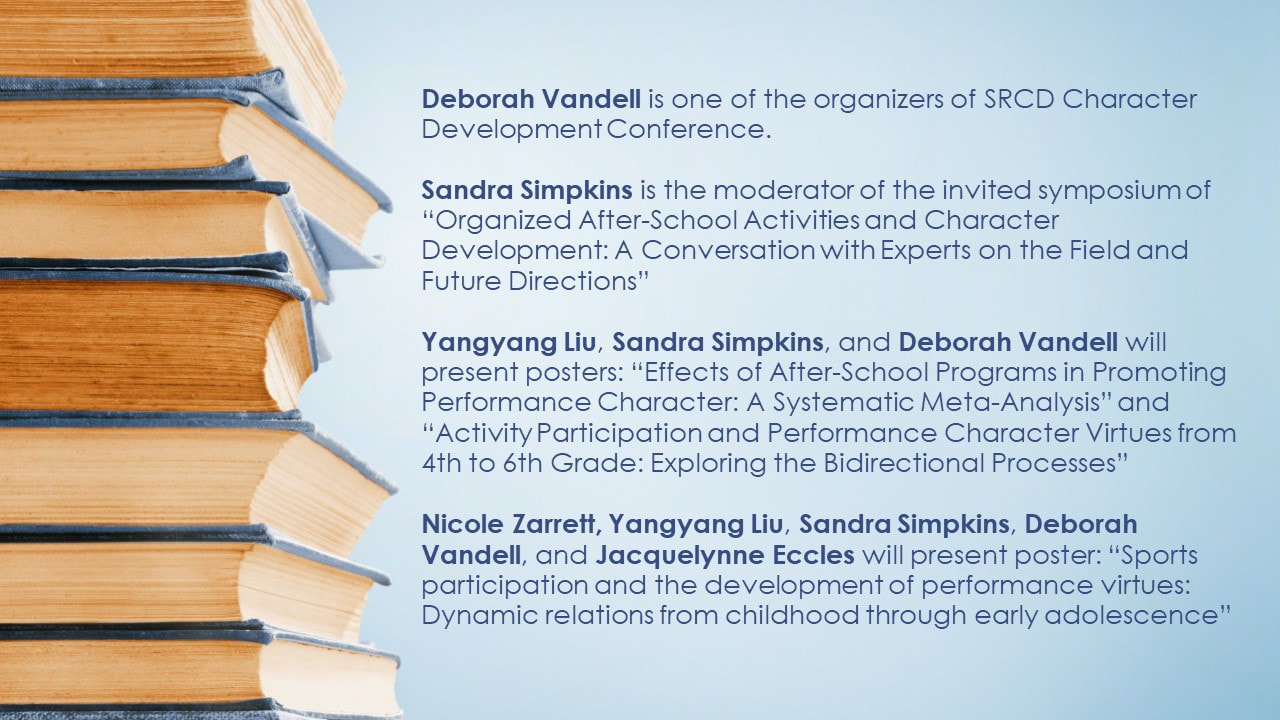NEWS 02/02/2021
Patterns of participation in afterschool programs, extracurricular activities, and unsupervised time are differentially linked to children's academic and social well-being. To learn more, click here.
A systematic review of the character literature reveals that organized activities are positively linked to youth’s concurrent and long-term moral and civic character development. To learn more, click here.
Two pathways, activities pathway and child pathway, were identified to predict less impulsivity and less police contact in adulthood. To learn more, click here.
Children’s works habits in first grade and the growth in work habits from first to sixth grade predicted higher academic achievement at the beginning of high school; overall grades, advanced classes, and college selectivity at the end of high school; and educational attainment at age 26. To learn more, click here.
A systematic review of the character literature reveals that organized activities are positively linked to youth’s concurrent and long-term moral and civic character development. To learn more, click here.
Two pathways, activities pathway and child pathway, were identified to predict less impulsivity and less police contact in adulthood. To learn more, click here.
Children’s works habits in first grade and the growth in work habits from first to sixth grade predicted higher academic achievement at the beginning of high school; overall grades, advanced classes, and college selectivity at the end of high school; and educational attainment at age 26. To learn more, click here.
NEWS 08/01/2020
Early child care and out‐of‐school time during middle childhood predicted higher academic achievement at age 15. In addition, they were differentially related to behavioral outcomes. To learn more, click here.
According to latent profile analysis, four profiles of prosocial behaviors were identified in middle childhood (Grade 4) and these profiles were differentially related to peer relationships in early adolescence (Grade 6). To learn more, click here.
The team had 7 conference proposals accepted to be presented at SRA 2020 conference. To learn more, click here.
According to latent profile analysis, four profiles of prosocial behaviors were identified in middle childhood (Grade 4) and these profiles were differentially related to peer relationships in early adolescence (Grade 6). To learn more, click here.
The team had 7 conference proposals accepted to be presented at SRA 2020 conference. To learn more, click here.
NEWS 04/25/2019
The team presented three research posters at the 2019 SRCD Biennial Meeting, Baltimore, Maryland.
According to teacher reports, children are grouped into one of four categories of prosocial behavior: High Prosocial, Primarily Friendly, Primarily Kind, and Low Prosocial. Children in the Low Prosocial group were more likely to be socially excluded by peers and aggressive with peers two years later. To learn more, click here.
Mothers and teachers tend to agree on 4th-grade children’s prosocial behavior when they are at the high or low ends. There is less agreement among mothers and teachers for children who were moderately prosocial. To learn more, click here.
According to mother and teacher reports on emotion regulation and self-control, children are better able to regulate their emotions and control their behavior as they progress from 3rd to 6th grade. However, mothers and teachers viewed the development of emotion regulation and self-control differently. To learn more, click here.
According to teacher reports, children are grouped into one of four categories of prosocial behavior: High Prosocial, Primarily Friendly, Primarily Kind, and Low Prosocial. Children in the Low Prosocial group were more likely to be socially excluded by peers and aggressive with peers two years later. To learn more, click here.
Mothers and teachers tend to agree on 4th-grade children’s prosocial behavior when they are at the high or low ends. There is less agreement among mothers and teachers for children who were moderately prosocial. To learn more, click here.
According to mother and teacher reports on emotion regulation and self-control, children are better able to regulate their emotions and control their behavior as they progress from 3rd to 6th grade. However, mothers and teachers viewed the development of emotion regulation and self-control differently. To learn more, click here.
NEWS 02/27/2019
The team presented three research posters at the 2018 SRCD Character Conference.
Children’s work habits at school increase from 2nd to 6th grade. Children who spent more time in organized after-school activities over these years had stronger work habits at Grade 6. To learn more, click here.
Third graders who had better relationships with mothers, teachers, and after-school activity leaders were also likely to be more prosocial with peers one year later compared to their peers. Specifically, children who experienced conflict with adults were less likely to be prosocial with peers. To learn more, click here.
We reviewed the existing research on organized activities and performance character (that is, behaviors that help people accomplish tasks). The most often studied performance character virtues are self-control, work habits, persistence, and positive outlook on the future. Researchers find that overall, organized activities promote performance characters. To learn more, click here.
Children’s work habits at school increase from 2nd to 6th grade. Children who spent more time in organized after-school activities over these years had stronger work habits at Grade 6. To learn more, click here.
Third graders who had better relationships with mothers, teachers, and after-school activity leaders were also likely to be more prosocial with peers one year later compared to their peers. Specifically, children who experienced conflict with adults were less likely to be prosocial with peers. To learn more, click here.
We reviewed the existing research on organized activities and performance character (that is, behaviors that help people accomplish tasks). The most often studied performance character virtues are self-control, work habits, persistence, and positive outlook on the future. Researchers find that overall, organized activities promote performance characters. To learn more, click here.
NEWS 08/27/2018
SRCD Character Development Conference will be held Oct 18-20, 2018 at Philadelphia.
See flyer below.
See flyer below.

